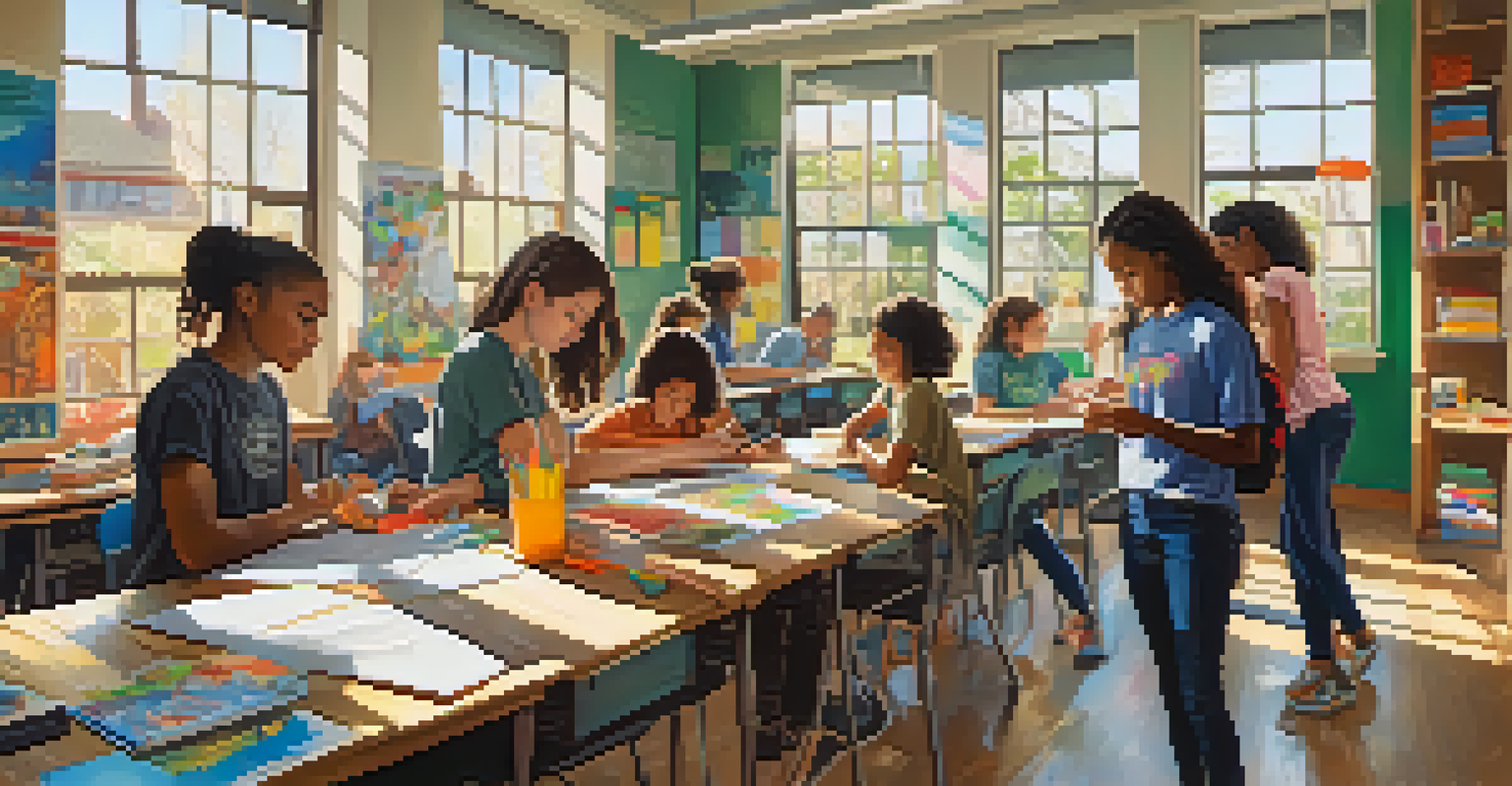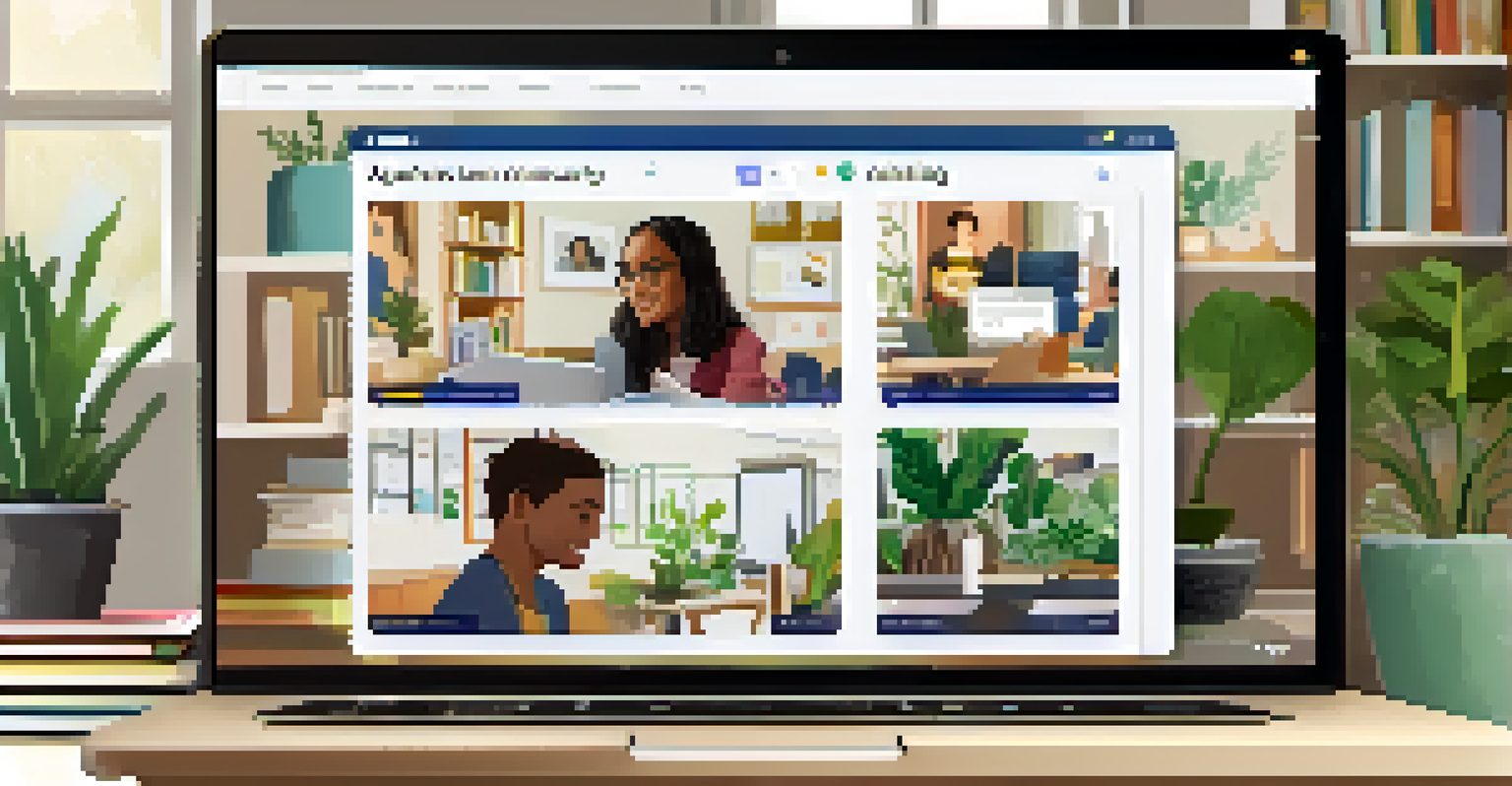Utilizing Online Resources for Project-Based Learning

Understanding Project-Based Learning and Its Benefits
Project-Based Learning (PBL) transforms the traditional approach to education by engaging students in real-world projects. This method promotes critical thinking, collaboration, and creativity, allowing learners to apply knowledge in a practical context. For example, instead of memorizing facts for a test, students might design a sustainable garden, integrating science and environmental studies.
Project-based learning is a powerful pedagogical approach that allows students to engage in meaningful projects that foster collaboration and critical thinking.
One of the most significant advantages of PBL is its ability to foster deeper understanding. When students work on projects that interest them, they are more motivated and invested in their learning journey. This intrinsic motivation can lead to better retention of information and the development of lifelong skills.
Additionally, PBL encourages collaboration among peers, which is essential in today’s interconnected world. Students learn to communicate effectively, delegate tasks, and support each other, all of which are vital skills in both academic and professional settings.
Exploring Online Resources for PBL
The internet is a treasure trove of resources that can enhance project-based learning experiences. Websites like Khan Academy, Coursera, and TED-Ed offer a wealth of knowledge on various subjects, making them excellent starting points for research. These platforms provide engaging videos, lectures, and interactive content that can inspire students to dive deeper into their projects.

Furthermore, online forums and communities, such as Reddit or Stack Exchange, allow students to connect with experts and enthusiasts in their fields of interest. This interaction can provide valuable insights and feedback, enriching the learning experience. Imagine a student designing a mobile app who can ask a software developer for advice—this real-world connection can be incredibly motivating.
PBL Enhances Real-World Skills
Project-Based Learning engages students in real-world projects, fostering critical thinking, collaboration, and creativity.
Additionally, digital libraries like Project Gutenberg offer access to a vast collection of texts that can support project research. By utilizing these resources, students can broaden their perspectives and incorporate diverse viewpoints into their projects.
Utilizing Multimedia Tools to Enhance Projects
Incorporating multimedia tools can significantly elevate the quality of student projects. Tools like Canva for graphic design, Prezi for presentations, and WeVideo for video editing empower students to express their ideas creatively. These platforms are user-friendly and often include templates, making it easy for students to get started, regardless of their technical skills.
The best way to predict the future is to create it, and project-based learning empowers students to shape their own educational journeys.
For instance, a group project on climate change could be transformed into an engaging video documentary using WeVideo. This not only makes the project more dynamic but also teaches students how to communicate complex ideas visually, an essential skill in today’s digital age.
Moreover, using multimedia tools can cater to different learning styles. Visual learners might thrive with infographics, while auditory learners could benefit from podcasts or narrated presentations, ensuring that all students can engage with the material in a way that suits them best.
Collaborating with Experts and Mentors Online
One of the most enriching aspects of project-based learning is the opportunity to collaborate with experts. Platforms like LinkedIn and even school-specific networks can connect students with professionals in their fields of interest. This mentorship can provide guidance, feedback, and inspiration, making a project feel more relevant and supported.
For example, if a student is working on a project about renewable energy, connecting with a local engineer could provide invaluable insights into the industry. This real-world connection can make the learning experience more authentic and motivate students to pursue their interests further.
Online Resources Expand Learning
Utilizing online platforms and communities enriches project-based learning experiences by providing access to diverse knowledge and expert feedback.
Additionally, many organizations offer mentorship programs or virtual workshops that students can join. These experiences can help students gain practical knowledge and network with professionals, paving the way for future opportunities.
Creating Virtual Learning Communities for PBL
Virtual learning communities (VLCs) can play a crucial role in project-based learning. Platforms like Google Classroom and Edmodo allow students to collaborate, share ideas, and provide feedback to one another in a structured environment. This sense of community fosters a supportive atmosphere where students feel comfortable sharing their work and learning from each other.
Moreover, VLCs can facilitate peer review, a valuable component of the learning process. When students assess each other’s projects, they gain insights into different approaches and perspectives, which can enhance their own work. This collaborative spirit encourages a growth mindset, where students view feedback as an opportunity for improvement.
Additionally, VLCs can help students develop digital citizenship skills. As they navigate these platforms, they learn how to communicate respectfully and responsibly online, preparing them for future interactions in both academic and professional settings.
Encouraging Reflection and Self-Assessment in PBL
Reflection is a vital part of project-based learning, allowing students to assess their experiences and growth. Online journals or blogs can be excellent tools for documenting this reflection process. By writing about their challenges, successes, and what they've learned, students can gain a deeper understanding of their learning journey.
For example, a student might reflect on how they overcame obstacles while working on their project, helping them recognize their resilience and problem-solving skills. This self-assessment can boost confidence and motivate them to tackle future challenges with a positive mindset.
Reflection Boosts Student Growth
Encouraging reflection and self-assessment helps students recognize their progress and develop a growth mindset throughout their learning journey.
Additionally, incorporating digital portfolios can help students showcase their work over time. By curating their projects, they can see their progress and share their achievements with peers, teachers, and family, creating a sense of pride in their accomplishments.
Measuring Success in Project-Based Learning
Measuring success in project-based learning can be complex, but online tools can help simplify this process. Rubrics and feedback forms can be easily created and shared through platforms like Google Forms or Microsoft Forms, providing clear criteria for assessment. This transparency helps students understand what is expected and how they can improve.
Additionally, using tools like Trello or Asana can aid in tracking progress throughout the project. Students can set goals, assign tasks, and monitor deadlines, fostering accountability and time management skills. This structured approach can lead to more organized and successful outcomes.

Finally, peer assessments and self-evaluations can provide valuable insights into the learning experience. By reflecting on their contributions and receiving feedback from classmates, students can gain a well-rounded perspective on their performance and areas for growth.